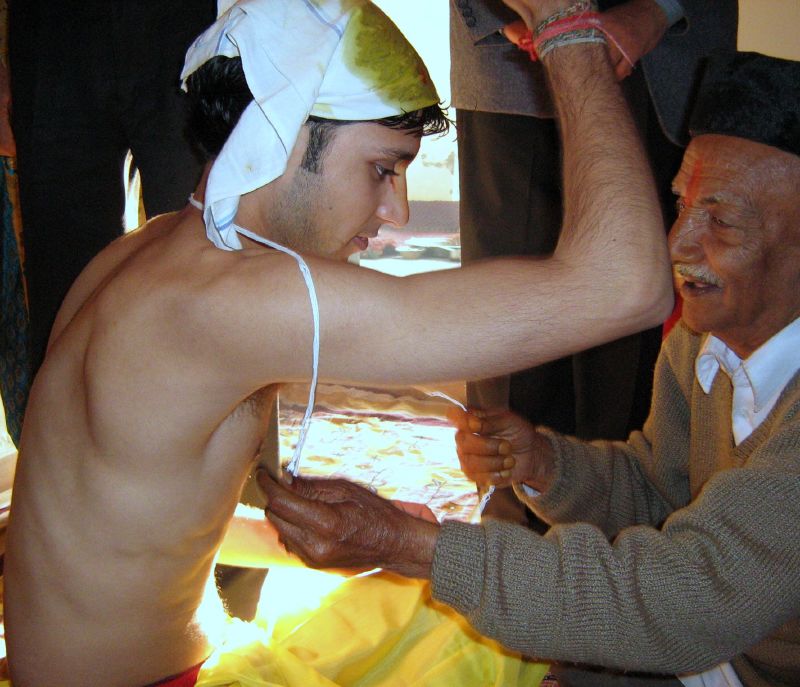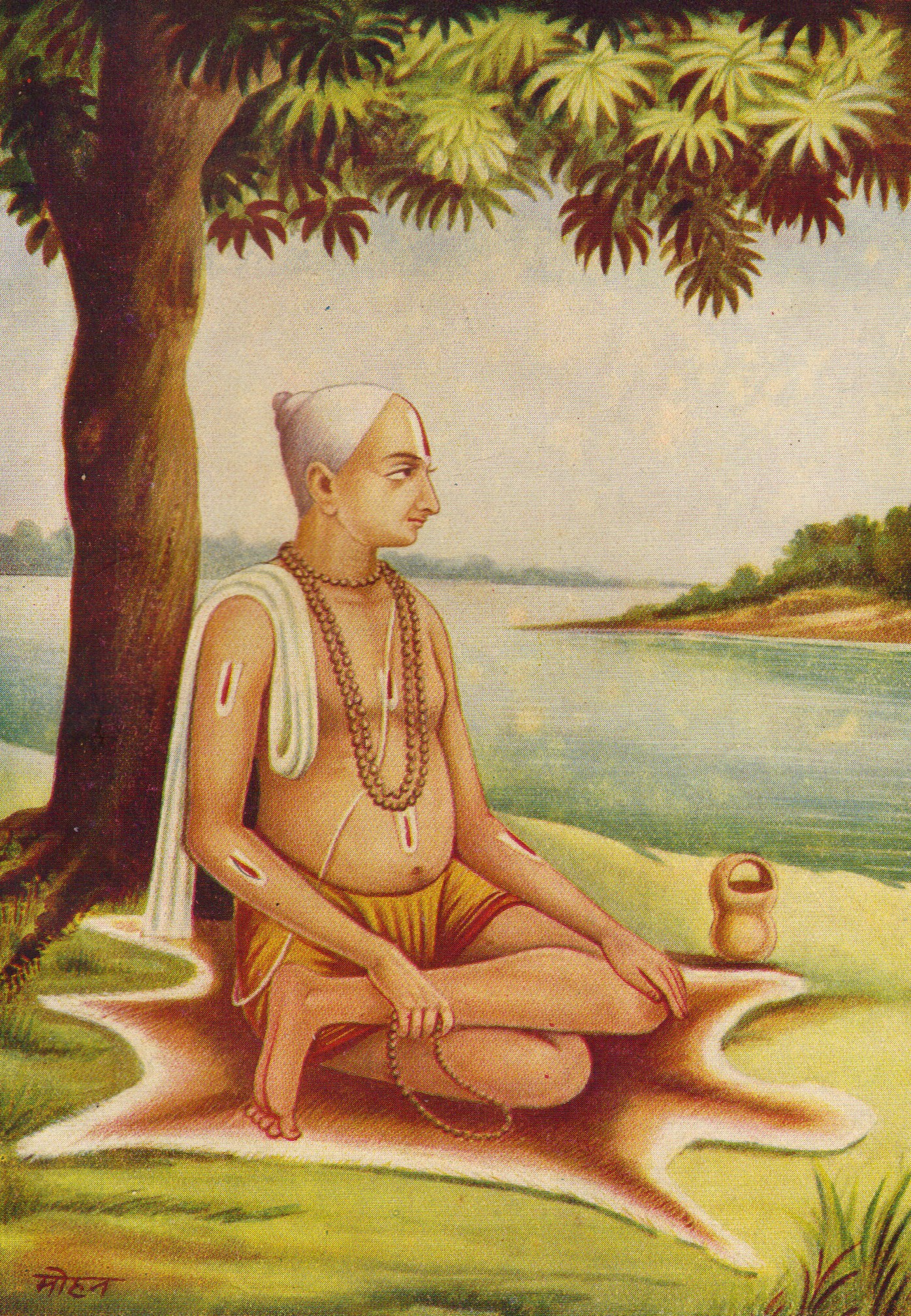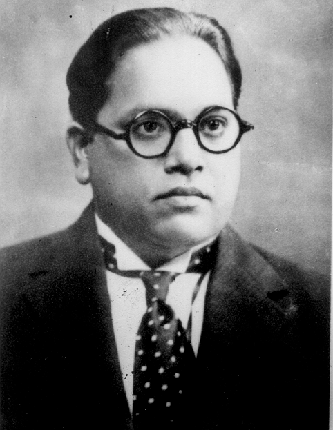|
Ramswaroop Verma
Ramswaroop Verma (22 August 1923 – 19 August 1998) was an Indian humanist. He was the founder of Arjak Sangh, a humanist organisation. The organisation emphasises social equality and is strongly opposed to Brahminism. Verma denied the existence of god and soul. He was strongly opposed to the doctrine of ''Karma'' and ''Fatalism''. Verma campaigned tirelessly against Brahminism and Untouchability. According to him, Brahminism is rooted in the doctrine of rebirth and it is not possible to eradicate it without attacking the doctrine of rebirth. Verma strongly asserts that Brahminism cannot be reformed, and it has to be negated totally. Biography Ramswaroop Verma was born on 22 August 1923 in Gaurikaran village of Kanpur district in the state of Uttar Pradesh, India in a Kurmi peasant family. Verma was married to Siyadulari as a student, but his wife died soon. Ramswaroop Verma did his M.A. in Hindi from Allahabad University in 1949 and Law Graduation from Agra University. ... [...More Info...] [...Related Items...] OR: [Wikipedia] [Google] [Baidu] |
Government Of Uttar Pradesh
The Government of Uttar Pradesh (ISO: Uttar Pradesh Sarkār; often abbreviated as GoUP) is the subnational government of the Indian state of Uttar Pradesh with the governor as its appointed constitutional head of the state by the President of India. The Governor of Uttar Pradesh is appointed for a period of five years and appoints the Chief Minister of Uttar Pradesh and their council of ministers, who are vested with the executive powers of the state. The governor remains a ceremonial head of the state, while the chief minister and their council are responsible for day-to-day government functions. The state of Uttar Pradesh's influence on Indian politics is important, and often paramount and/or a bellwether, as it sends the most members of parliament to both the Lok Sabha and the Rajya Sabha, the state's population being more than 200 million; approximately double that of the next-most populous state. Legislature The state is governed by a parliamentary system of representat ... [...More Info...] [...Related Items...] OR: [Wikipedia] [Google] [Baidu] |
Agra
Agra (, ) is a city on the banks of the Yamuna river in the Indian state of Uttar Pradesh, about south-east of the national capital New Delhi and 330 km west of the state capital Lucknow. With a population of roughly 1.6 million, Agra is the fourth-most populous city in Uttar Pradesh and List of cities in India by population, twenty-third most populous city in India. Agra's notable historical period began during Sikandar Lodi's reign, but the golden age of the city began with the Mughals. Agra was the foremost city of the Indian subcontinent and the capital of the Mughal Empire under Mughal emperors Babur, Humayun, Akbar, Jahangir and Shah Jahan. Under Mughal rule, Agra became a centre for learning, arts, commerce, and religion, and saw the construction of the Agra Fort, Sikandra, Agra, Sikandra and Agra's most prized monument, the Taj Mahal, built by Shah Jahan as a mausoleum for his favourite empress. With the decline of the Mughal empire in the late 18th century, the ci ... [...More Info...] [...Related Items...] OR: [Wikipedia] [Google] [Baidu] |
Bahujan Samaj Party
The Bahujan Samaj Party (BSP) is a national level political party in India that was formed to represent Bahujans (literally means "community in majority"), referring to Scheduled Castes, Scheduled Tribes, and Other Backward Classes (OBC), along with religious minorities. According to Kanshi Ram, when he founded the party in 1984, the Bahujans comprised 85 percent of India's population, but were divided into 6,000 different castes. The party claims to be inspired by the philosophy of B. R. Ambedkar, Mahatma Jyotiba Phule, Narayana Guru, Chhatrapati Shahuji Maharaj, Gautama Buddha, and Jesus Christ. Kanshi Ram named his protégée, Mayawati, as his successor in 2001. The BSP has its main base in the Indian state of Uttar Pradesh where it was the second-largest party in the 2019 Indian general election with 19.3% of votes and third-largest in the 2022 Uttar Pradesh Legislative Assembly election with 12.88% of votes. Its election symbol is an elephant which is the same sym ... [...More Info...] [...Related Items...] OR: [Wikipedia] [Google] [Baidu] |
Dvija
Dvija (Sanskrit: द्विज) means "twice-born" in ancient Indian Sanskrit. The concept is premised on the belief that a person is first born physically and at a later date is born for a second time spiritually, usually when he undergoes the ritual of passage that initiates him into a school for Vedic studies.Dvija Encyclopedia Britannica (2014) The term also refers to members of the three varnas in the traditional Hindu social system, or social classes — the Brahmins (priests and teachers), Kshatriyas (warriors), and Vaishyas (farmers, herders and merchants) — whose Sanskara of i ... [...More Info...] [...Related Items...] OR: [Wikipedia] [Google] [Baidu] |
Krishna
Krishna (; sa, कृष्ण ) is a major deity in Hinduism. He is worshipped as the eighth avatar of Vishnu and also as the Supreme god in his own right. He is the god of protection, compassion, tenderness, and love; and is one of the most popular and widely revered among Indian divinities. Krishna's birthday is celebrated every year by Hindus on Krishna Janmashtami according to the lunisolar Hindu calendar, which falls in late August or early September of the Gregorian calendar. The anecdotes and narratives of Krishna's life are generally titled as ''Krishna Leela''. He is a central character in the ''Mahabharata'', the '' Bhagavata Purana'', the ''Brahma Vaivarta Purana,'' and the '' Bhagavad Gita'', and is mentioned in many Hindu philosophical, theological, and mythological texts. They portray him in various perspectives: as a god-child, a prankster, a model lover, a divine hero, and the universal supreme being. Quote: "Krsna's various appearances as a di ... [...More Info...] [...Related Items...] OR: [Wikipedia] [Google] [Baidu] |
Rama
Rama (; ), Ram, Raman or Ramar, also known as Ramachandra (; , ), is a major deity in Hinduism. He is the seventh and one of the most popular '' avatars'' of Vishnu. In Rama-centric traditions of Hinduism, he is considered the Supreme Being. Rama is said to have been born to Kaushalya and Dasharatha in Ayodhya, the ruler of the Kingdom of Kosala. His siblings included Lakshmana, Bharata, and Shatrughna. He married Sita. Though born in a royal family, their life is described in the Hindu texts as one challenged by unexpected changes such as an exile into impoverished and difficult circumstances, ethical questions and moral dilemmas. Of all their travails, the most notable is the kidnapping of Sita by demon-king Ravana, followed by the determined and epic efforts of Rama and Lakshmana to gain her freedom and destroy the evil Ravana against great odds. The entire life story of Rama, Sita and their companions allegorically discusses duties, rights and social responsibil ... [...More Info...] [...Related Items...] OR: [Wikipedia] [Google] [Baidu] |
Tulsidas
Tulsidas (; born Rambola Dubey; also known as Goswami Tulsidas; c.1511pp. 23–34.–1623) was a Ramanandi Vaishnava Hindu saint and poet, renowned for his devotion to the deity Rama. He wrote several popular works in Sanskrit and Awadhi, but is best known as the author of the ''Hanuman Chalisa'' and of the epic '' '', a retelling of the Sanskrit ''Ramayana'' based on Rama's life in the vernacular Awadhi. Tulsidas spent most of his life in the city of Varanasi and Ayodhya. The Tulsi Ghat on the Ganges River in Varanasi is named after him. He founded the Sankatmochan Temple dedicated to Lord Hanuman in Varanasi, believed to stand at the place where he had the sight of the deity. Tulsidas started the Ramlila plays, a folk-theatre adaptation of the Ramayana.: ... this book ... is also a drama, because Goswami Tulasidasa started his ''Ram Lila'' on the basis of this book, which even now is performed in the same manner everywhere. He has been acclaimed as one of the greatest poet ... [...More Info...] [...Related Items...] OR: [Wikipedia] [Google] [Baidu] |
Ramcharitmanas
''Ramcharitmanas'' ( deva, श्रीरामचरितमानस, Rāmacaritamānasa), is an epic poem in the Awadhi language, based on the ''Ramayana'', and composed by the 16th-century Indian bhakti poet Tulsidas (c. 1532–1623). This work is also called, in popular parlance, ''Tulsi Ramayana'', ''Tulsikrit Ramayana'', or ''Tulsidas Ramayana''. The word ''Ramcharitmanas'' literally means "Lake of the deeds of Rama". It is considered one of the greatest works of Hindu literature. The work has variously been acclaimed as "the living sum of Indian culture", "the tallest tree in the magic garden of medieval Indian poetry", "the greatest book of all devotional literature" and "the best and most trustworthy guide to the popular living faith of the Indian people".Lutgendorf 1991, p. 1. Tulsidas was a great scholar of Sanskrit. However, he wanted the story of Rama to be accessible to the general public, as many Apabhramsa languages had evolved from Sanskrit and at that time fe ... [...More Info...] [...Related Items...] OR: [Wikipedia] [Google] [Baidu] |
Bahujan Samaj Party
The Bahujan Samaj Party (BSP) is a national level political party in India that was formed to represent Bahujans (literally means "community in majority"), referring to Scheduled Castes, Scheduled Tribes, and Other Backward Classes (OBC), along with religious minorities. According to Kanshi Ram, when he founded the party in 1984, the Bahujans comprised 85 percent of India's population, but were divided into 6,000 different castes. The party claims to be inspired by the philosophy of Gautama Buddha, B. R. Ambedkar, Mahatma Jyotiba Phule, Narayana Guru, Periyar E. V. Ramasamy and Chhatrapati Shahuji Maharaj. Kanshi Ram named his protégée, Mayawati, as his successor in 2001. The BSP has its main base in the Indian state of Uttar Pradesh where it was the second-largest party in the 2019 Indian general election with 19.3% of votes and third-largest in the 2022 Uttar Pradesh Legislative Assembly election with 12.88% of votes. Its election symbol is an elephant which is the sam ... [...More Info...] [...Related Items...] OR: [Wikipedia] [Google] [Baidu] |
Ambedkar
Bhimrao Ramji Ambedkar (14 April 1891 – 6 December 1956) was an Indian jurist, economist, social reformer and political leader who headed the committee drafting the Constitution of India from the Constituent Assembly of India, Constituent Assembly debates, served as Ministry of Law and Justice (India), Law and Justice minister in the First Nehru ministry, first cabinet of Jawaharlal Nehru, and inspired the Dalit Buddhist movement after renouncing Hinduism. Ambedkar graduated from Elphinstone College, University of Bombay, and studied economics at Columbia University and the London School of Economics, receiving doctorates in 1927 and 1923 respectively and was among a handful of Indian students to have done so at either institution in the 1920s. He also trained in the law at Gray's Inn, London. In his early career, he was an economist, professor, and lawyer. His later life was marked by his political activities; he became involved in campaigning and negotiations for I ... [...More Info...] [...Related Items...] OR: [Wikipedia] [Google] [Baidu] |
Humanism
Humanism is a philosophical stance that emphasizes the individual and social potential and agency of human beings. It considers human beings the starting point for serious moral and philosophical inquiry. The meaning of the term "humanism" has changed according to the successive intellectual movements that have identified with it. During the Italian Renaissance, ancient works inspired scholars in various Italian cities, giving rise to a movement now called Renaissance humanism. With Enlightenment, humanistic values were re-enforced by the advances in science and technology, giving confidence to humans in their exploration of the world. By the early 20th century, organizations solely dedicated to humanism flourished in Europe and the United States, and have since expanded all over the globe. In the current day, the term generally refers to a focus on human well-being and advocates for human freedom, autonomy, and progress. It views humanity as responsible for the promotio ... [...More Info...] [...Related Items...] OR: [Wikipedia] [Google] [Baidu] |
Charan Singh
Chaudhary Charan Singh (23 December 1902 – 29 May 1987) served as the 5th Prime Minister of India between 28 July 1979 to 14 January 1980. Historians and people alike frequently refer to him as the 'champion of India's peasants.' Charan Singh was born on 23 December 1902 in a rural peasant Hindu Jat family of the Teotia clan of village Noorpur, United Provinces of Agra and Oudh. Charan Singh entered politics as part of the Indian Independence Movement motivated by Mahatma Gandhi. He was active from 1931 in the Ghaziabad District Arya Samaj as well as the Meerut District Indian National Congress for which he was jailed twice by the British. Before independence, as a member of Legislative Assembly of the United Provinces elected in 1937, he took a deep interest in the laws that were detrimental to the village economy and he slowly built his ideological and practical stand against the exploitation of tillers of the land by landlords. Between 1952 to 1967, he was one of "thre ... [...More Info...] [...Related Items...] OR: [Wikipedia] [Google] [Baidu] |








